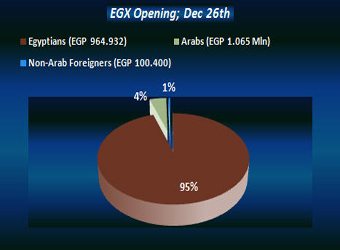During Wednesday’s opening session, the Egyptian Exchange (EGX) has posted early losses of EGP 207 million. The capital market has amounted to EGP 367.197 billion, according to data compiled by Amwal Al Ghad at 10:57 a.m. Cairo time (08:57 GMT).
The EGX indices opened in red except for the mid-cap index EGX70.
The main index, EGX30 dipped by 0.08% to 5314.73 p. EGX20 went down by 0.11% to 6117.25 p.
Meanwhile, the mid- and small-cap index, the EGX70 inched up by 0.03% to 469.73 p. Price index EGX100 dropped by 0.05% to 785.97 p.
This was after trading in 55 listed securities; 12 declined, 10 advanced; while 33 keeping their previous levels.
The local as well as non-Arab foreign selling pressures have driven EGX’s early losses as they were net sellers seizing 95.15% and 0.43% respectively, of the total markets, with a net equity of EGP 964.932 thousand and EGP 100.400 thousand excluding the deals.
Meanwhile, Arabs were net buyers seizing 4.42% of the total markets, with a net equity of EGP 1.065 million excluding the deals.
The official approval of Egypt’s disputed, Islamist-backed constitution Tuesday held out little hope of stabilizing the country after two years of turmoil and Islamist President Mohammed Morsi may now face a more immediate crisis with the economy falling deeper into distress.
In a clear sign of anxiety over the economy, the turbulence of the past month and expected austerity measures ahead have some Egyptians hoarding dollars for fear the currency is about to take a significant turn for the weaker.
The battle over the constitution left Egypt deeply polarized at a time when the government is increasingly cash-strapped. Supporters of the charter campaigned for it on the grounds that it will lead to stability, improve the grip of Morsi and his allies on state institutions, restore investor confidence and bring back tourists.
“In times of change, politics are the driver of the economy and not the other way around,” said Mourad Aly, a media adviser for the political arm of the fundamentalist Muslim Brotherhood, the backbone of Morsi’s presidency and the main group that backed the constitution.
But there are already multiple fights on the horizon.
The U.S. State Department bluntly told Morsi it was now time to make compromises, acknowledging deep concerns over the constitution.
“President Morsi, as the democratically elected leader of Egypt, has a special responsibility to move forward in a way that recognizes the urgent need to bridge divisions, build trust, and broaden support for the political process,” said Patrick Ventrell, acting deputy spokesman. “We hope those Egyptians disappointed by the result will seek more and deeper engagement. “
He said Egypt “needs a strong, inclusive government to meet its many challenges.”
After a spate of resignations of senior aides and advisers during the constitutional crisis, Morsi appeared to have lost another member of his government late Tuesday night when his communications minister posted on his Twitter account that he was resigning.
The minister Hany Mahmoud said he “couldn’t cope with the culture of government work, particular in the current conditions of the country.” The resignation could not be immediately verified because it came so late at night.
Morsi signed a decree Tuesday night that put the new constitution into effect after the election commission announced the official results of the referendum held over the past two weekends. It said the constitution has passed with a 63.8 percent “yes.” Turnout of 32.9 percent of Egypt’s nearly 52 million registered voters was lower than most other elections since the uprising nearly two years ago that ousted authoritarian leader Hosni Mubarak
Morsi is expected to call for a new election of parliament’s lawmaking lower house within two months.


